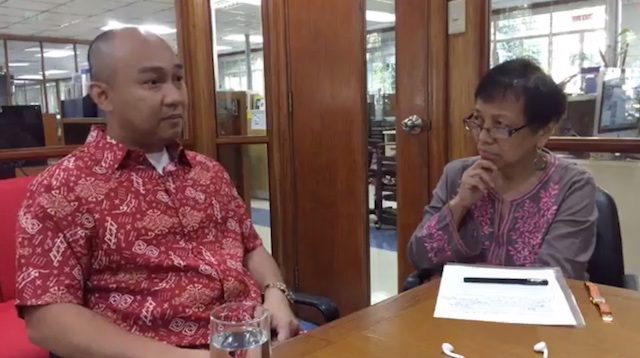SUMMARY
This is AI generated summarization, which may have errors. For context, always refer to the full article.

MANILA, Philippines – Once called the “Sick Man of Asia,” the Philippines is now among Southeast Asia’s fastest-growing economies. But while money deficit is no longer the country’s main problem, it seems to be suffering from a new kind of deficit: lack of trust in institutions.
“Trust is an important by-product of strong institutions. This is really why you build institutions that outlast government officials and regimes. Even if you transfer from one official to another, if you trust the institution, everyone aligns to continue to strengthen the institution, and implement collective action,” Ateneo School of Government dean Ronald Mendoza said on Wednesday, January 18.
Mendoza said that since the fall of the Marcos dictatorship – a period that he said was characterized by “erosion of trust” and division among Filipinos – countless leaders have tried to restore citizens’ trust in their democratically-elected government.
And to some extent, there have been successes: the Philippines won its first investment grade rating in 2013 – a vote of confidence in countries considered safe to invest in.
But the challenge, Mendoza said, was to sustain the reforms that would keep Filipinos and the international community confident in the Philippines’ institutions – including its judiciary, central bank, and other agencies related to governance.
He added that while it took years for the Philippines to recover from the Marcos-era erosion of trust, undoing all of that progress doesn’t take too long.
“Institution-building is a very long and tedious process but institution-destroying is a very quick process. In the hands of the wrong people, if you put the institution in the hands of people who will abuse it, it will not take 25 years again to destroy it,” he said.
“It will be very quick. Trust will be eroded, doubt will be planted in people’s minds, and that’s unfortunately the risk that we still face,” Mendoza added.
Sustaining reforms
Part of the challenge, Mendoza said, was how to explain the process of setting solutions in place. Reforms should produce enough results so that citizens will continue imbuing government institutions with a “down payment of trust.”
But some solutions may not yield immediate results, although these would be ultimately beneficial in the long run. These, Mendoza said, are the kinds of solutions that would be difficult to explain or communicate to the public.
“Napakahirap ipaliwanag na ang isang reporma, maganda ang design, pero ‘yung implementation niya, maaaring magkamali tayo doon. At kung nagkamali tayo doon, baka ang knee-jerk reaction nating lahat, i-junk ‘yung reform,” he said.
(It’s very hard to explain that reforms may be designed well, but may encounter mistakes at the implementation level. And if we make a mistake there, our knee-jerk reaction might be to junk that reform.)
People also tended to look to a single person as the face of reform instead of scrutinizing the actual solutions being proposed.
“Nandoon tayo sa level na napakalaki ng paniniwala natin hindi sa institusyon, kundi doon sa reformist. Tapos akala natin iisang tao, aayusin lahat ‘yan, when in fact that person needs all of us to help out,” Mendoza said.
(We’re still at the level where we place our trust not on the institution, but on the reformist. And then we think that just one person can fix all the problems, when in fact that person needs all of us to help out.)
To ensure that reforms are sustained and strengthened in an institution, Mendoza said leaders should have a degree of humility: to acknowledge that their role is to “make the next person look a lot better than me.”
“Our economy is quite strong for the most part because the administration we have right now is building on the gains of the last administration. That’s the kind of thing we want to see more of. ‘Yung maganda, palakasin pa; ‘yung pangit tanggalin (Strengthen the good practices and remove the bad ones). But you don’t need to start from scratch and that’s how you build institutions over time,” Mendoza said.
“We’re seeing people putting a lot of trust in the Duterte administration, which, I think, is a good sign; that’s the down payment on pushing reforms. And one hopes that they will use all that political capital to push the right reforms, the deep structural reforms that our country really needs,” he added. – Rappler.com
Add a comment
How does this make you feel?
There are no comments yet. Add your comment to start the conversation.